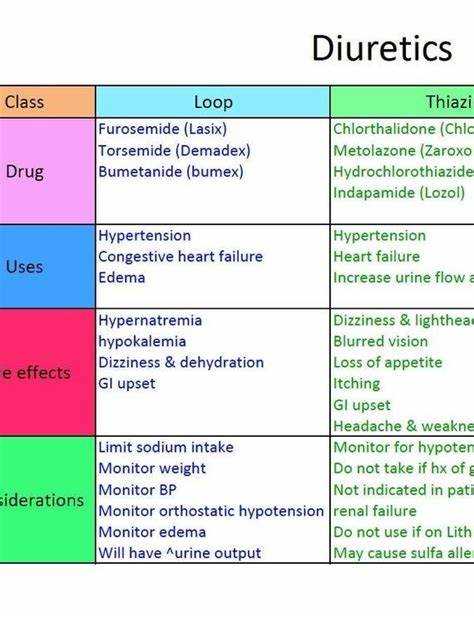
Are you looking for a natural solution to ease your symptoms of depression and bloating? Look no further than this unique combination of Amitriptyline and diuretics.
Amitriptyline is a medication commonly used to treat depression, but it can also be effective in relieving other symptoms, such as anxiety and sleeplessness. Meanwhile, diuretics help your body get rid of excess fluid, reducing bloating and water retention.
By combining these two powerful aids, you can experience a holistic approach to managing your mental and physical well-being. Say goodbye to bloating and hello to a brighter, more balanced you!
Understanding the benefits of combining Amitriptyline with diuretics
In managing the effects of certain water pills, known as diuretics, a combination with the medication Amitriptyline can provide numerous benefits. When used together, these medications work synergistically to address various health conditions by complementing each other’s actions.
Enhanced Effectiveness

Amitriptyline, a medication commonly used to treat depression and other mental health conditions, can enhance the effectiveness of diuretics in managing specific health concerns. By working hand in hand, Amitriptyline and diuretics provide a comprehensive approach to addressing the underlying causes of various health conditions.
Reduced Side Effects

Another significant benefit of combining Amitriptyline with diuretics is the potential reduction in side effects. Amitriptyline can help manage the side effects commonly associated with diuretics intake, such as electrolyte imbalances, muscle cramps, and dehydration. By regulating these adverse effects, the combination of these medications ensures a more tolerable and comfortable treatment experience for patients.
The role of Amitriptyline in managing the side effects of diuretics is crucial, as it allows individuals to continue their treatment without experiencing substantial discomfort or disruption in their daily lives.
Customized Treatment Approach
The combination of Amitriptyline and diuretics offers a customized treatment approach for individuals with specific health conditions. By tailoring the treatment plan to suit the individual’s needs, doctors can optimize the therapeutic outcomes and improve patient satisfaction. This personalized approach ensures that patients receive the most effective and well-tolerated treatment possible.
It is important to consult with a healthcare professional to determine if combining Amitriptyline with diuretics is appropriate for your specific health needs. They can evaluate your medical history, current medications, and potential contraindications before recommending this combination therapy. This collaborative decision-making process ensures the safety and efficacy of your treatment plan.
Overall, the combination of Amitriptyline with diuretics presents significant benefits in managing health conditions and reducing unwanted side effects. By understanding the potential advantages of this therapeutic approach, individuals can make informed decisions in partnership with their healthcare providers.
Highlighting the role of Amitriptyline in managing side effects of diuretics
In this section, we will delve into the important role that Amitriptyline plays in managing the various side effects that can arise from the use of diuretics. By understanding and appreciating the benefits that Amitriptyline offers, patients can effectively address these side effects and improve their overall well-being.
One potential side effect of diuretics is dehydration, which can lead to symptoms such as dizziness, fatigue, and muscle cramps. Amitriptyline, as a medication that acts on the central nervous system, can help alleviate these symptoms by regulating the body’s fluid balance and promoting hydration.
Additionally, diuretics may cause electrolyte imbalances, particularly a decrease in potassium levels. Low potassium levels can result in muscle weakness, irregular heartbeat, and other complications. By combining diuretics with Amitriptyline, patients can benefit from its potassium-sparing effect, which helps maintain healthy potassium levels and prevents these adverse effects.
Furthermore, diuretics are sometimes associated with sleep disturbances, such as frequent nighttime urination or insomnia. Amitriptyline, known for its sedative properties, can aid in promoting better sleep by improving sleep quality and reducing awakenings during the night.
It is important to note that while the combination of Amitriptyline and diuretics can be beneficial in managing side effects, it is crucial for patients to consult their healthcare provider and carefully monitor their condition. Certain diuretics, when combined with Amitriptyline, may potentially increase the risk of adverse effects, and close medical supervision is necessary to ensure the optimal and safe use of these medications.
Raising awareness about the potential risks of combining Amitriptyline with certain diuretics
In this section, we aim to inform our readers about the importance of being cautious when combining the medication Amitriptyline with specific types of diuretics. While both Amitriptyline and diuretics are commonly prescribed medications for various conditions, their combination can pose potential risks and should be carefully monitored by a healthcare professional.
It is crucial to understand that certain diuretics, when combined with Amitriptyline, can lead to an increased risk of side effects or adverse reactions. These medications work by different mechanisms in the body and may interact in a way that affects their effectiveness or safety. Therefore, it is important for individuals taking both medications to be aware of these risks and to discuss them with their healthcare provider.
For individuals who are prescribed Amitriptyline for depression, anxiety, or other mental health conditions, it is especially important to be cautious when combining it with diuretics. Certain diuretics, such as loop diuretics or thiazide diuretics, may interfere with the metabolism or elimination of Amitriptyline, potentially leading to an increased concentration of the medication in the body.
Patients should be informed about the potential risks associated with this combination, including an increased risk of side effects such as drowsiness, dizziness, dry mouth, constipation, or changes in heart rhythm. It is essential for individuals to promptly report any unusual symptoms or side effects to their healthcare provider to ensure appropriate management and adjustment of their medication regimen if needed.
In conclusion, while the combination of Amitriptyline and diuretics can be beneficial in certain cases, it is necessary for patients to be aware of the potential risks and to seek medical advice to ensure the safe and effective use of these medications together.
